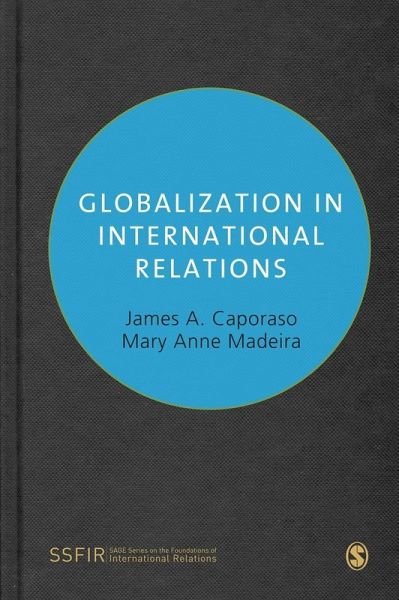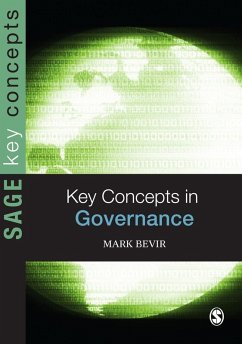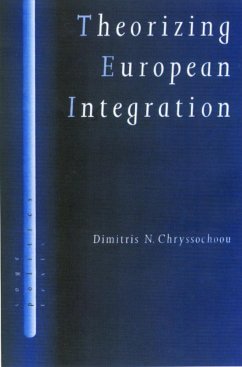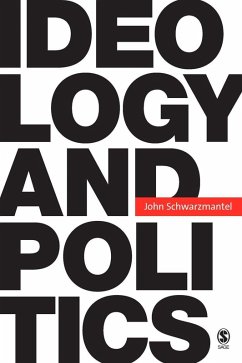
Globalization, Institutions and Governance (eBook, PDF)
Versandkostenfrei!
Sofort per Download lieferbar
40,95 €
inkl. MwSt.
Weitere Ausgaben:

PAYBACK Punkte
20 °P sammeln!
The study of international relations now goes well beyond state-to-state politics and even regional politics. Technological forces are working their effects on the world as a whole, bringing state and non-state actors into contact with one another. Globalization, Institutions and Governance provides students with a sophisticated and engaging exploration of the often differing impacts of these technological forces and the wider implications of globalization for theories of global governance and the role of international institutions.This title is part of the SAGE Series on the Foundations of In...
The study of international relations now goes well beyond state-to-state politics and even regional politics. Technological forces are working their effects on the world as a whole, bringing state and non-state actors into contact with one another. Globalization, Institutions and Governance provides students with a sophisticated and engaging exploration of the often differing impacts of these technological forces and the wider implications of globalization for theories of global governance and the role of international institutions.
This title is part of the SAGE Series on the Foundations of International Relations. This series fills the gap between narrowly-focused research monographs and broad introductory texts, providing graduate students with state-of-the-art, critical overviews of the key sub-fields within International Relations: International Political Economy, International Security, Foreign Policy Analysis, International Organization, Normative IR Theory, International Environmental Politics, Globalization, and IR Theory.
Explicitly designed to further the transatlantic dialogue fostered by publications such as the SAGE Handbook of International Relations, the series is written by renowned scholars drawn from North America, continental Europe and the UK. The books are intended as core texts on advanced courses in IR, taking students beyond the basics and into the heart of the debates within each field, encouraging an independent, critical approach and signposting further avenues of research.
Series Editors:
Walter Carlsnaes Uppsala University, Sweden
Jeffrey T. Checkel Simon Fraser University, Canada
International Advisory Board: Peter J. Katzenstein Cornell University, USA; Emanuel Adler University of Toronto, Canada; Martha Finnemore George Washington University, USA; Andrew Hurrell Oxford University, UK; G. John Ikenberry Princeton University, USA; Beth Simmons Harvard University, USA; Steve Smith University of Exeter, UK; Michael Zuern Hertie School of Governance, Berlin, Germany.
This title is part of the SAGE Series on the Foundations of International Relations. This series fills the gap between narrowly-focused research monographs and broad introductory texts, providing graduate students with state-of-the-art, critical overviews of the key sub-fields within International Relations: International Political Economy, International Security, Foreign Policy Analysis, International Organization, Normative IR Theory, International Environmental Politics, Globalization, and IR Theory.
Explicitly designed to further the transatlantic dialogue fostered by publications such as the SAGE Handbook of International Relations, the series is written by renowned scholars drawn from North America, continental Europe and the UK. The books are intended as core texts on advanced courses in IR, taking students beyond the basics and into the heart of the debates within each field, encouraging an independent, critical approach and signposting further avenues of research.
Series Editors:
Walter Carlsnaes Uppsala University, Sweden
Jeffrey T. Checkel Simon Fraser University, Canada
International Advisory Board: Peter J. Katzenstein Cornell University, USA; Emanuel Adler University of Toronto, Canada; Martha Finnemore George Washington University, USA; Andrew Hurrell Oxford University, UK; G. John Ikenberry Princeton University, USA; Beth Simmons Harvard University, USA; Steve Smith University of Exeter, UK; Michael Zuern Hertie School of Governance, Berlin, Germany.
Dieser Download kann aus rechtlichen Gründen nur mit Rechnungsadresse in A, D ausgeliefert werden.













